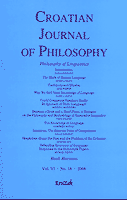Skepticism About the Past and the Problem of the Criterion
Skepticism About the Past and the Problem of the Criterion
Author(s): Bryson BrownSubject(s): Philosophy
Published by: KruZak
Summary/Abstract: An argument for skepticism about the past exploits a circularity in the arguments connecting present observations to claims about past events. Arguments supporting claims about the past depend on current observations together with processes linking current observations to those claims. But knowledge of processes requires knowledge of the past: Knowledge of the present alone cannot provide evidence for claims about the past. A practical, coherentist response to this challenge rejects the assumption that we come to the problem with no information about the past. Beginning with partial and imperfect information about the past, a coherentist tests ideas about processes against the particular evidence of traces left by past processes, and particular claims about the past against ideas about the processes linking those events to present traces. However, this common-sense response is inadequate when faced with a radical skeptic prepared to insist on the problem of the criterion. An answer to this radical skeptic can be drawn from Wilfrid Sellars ‘bootstrap’ argument in “Empiricism and the Philosophy of Mind.” The result is a better response to the problem of the criterion than Chisholm’s ‘particularism’.
Journal: Croatian Journal of Philosophy
- Issue Year: VI/2006
- Issue No: 17
- Page Range: 291-306
- Page Count: 16
- Language: English
- Content File-PDF

